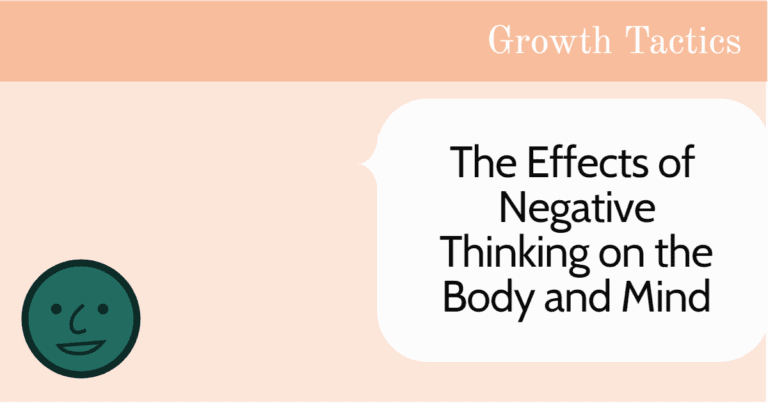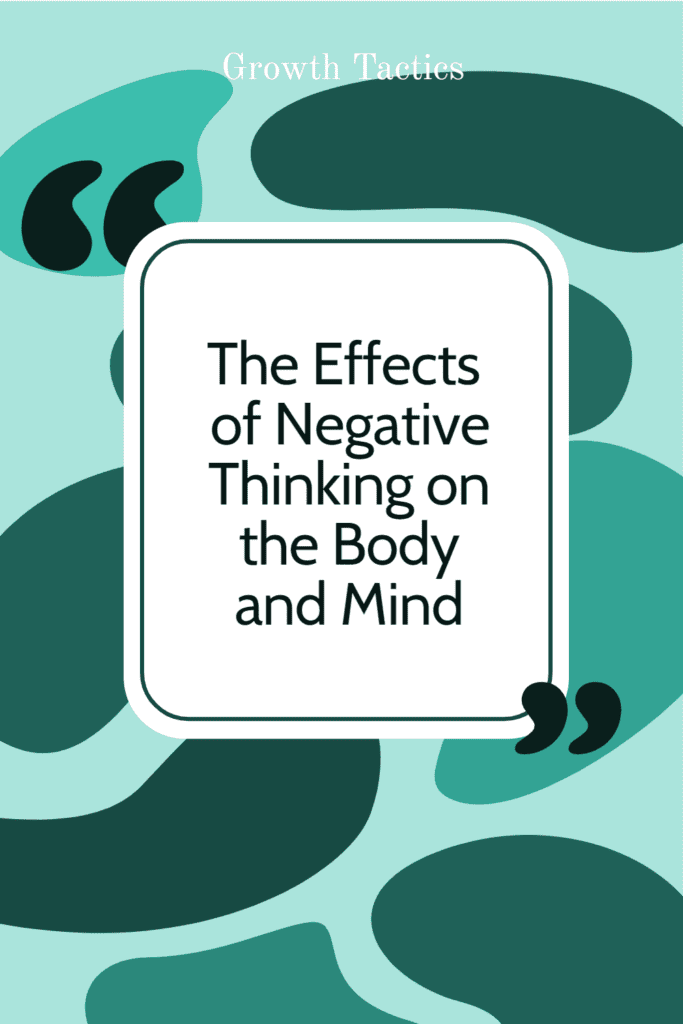Negative thinking has become all too common in our fast-paced and demanding world. The constant pressures we face can easily fuel pessimism, self-doubt, and cynicism, creating a toxic cycle that affects our overall well-being. In this blog post, we will delve into the effects of negative thinking on the body and mind.
Jump To Section
Understanding Negative Thinking
Negative thinking is a common habit that can have a significant impact on our overall well-being. It involves focusing on the unfavorable aspects of a situation or ourselves while disregarding the positive aspects. By understanding negative thinking and its effects, we can take steps to cultivate a more positive mindset.
Definition and Impact of Negative Thinking
Negative thinking is the tendency to dwell on negative thoughts, emotions, and experiences. It can lead to a pessimistic outlook on life and hinder our ability to enjoy positive events. The impact of negative thinking goes beyond our mental state and can also affect our physical health. Research shows that chronic negative thinking can lead to various health problems, including cardiovascular issues, weakened immune systems, digestive problems, and high levels of stress hormones.
How Negative Thinking Impacts Our Thoughts and Emotions
Negative thinking has a profound influence on our thoughts and emotions. It becomes an automatic response, shaping our perspective on various aspects of life such as relationships, work, and personal accomplishments. It can magnify problems and minimize positive experiences, leading to feelings of sadness, anxiety, and frustration.
Negative thinking can also create a cycle of self-blame and self-doubt. It erodes our self-esteem and confidence, making it difficult to see our own worth and capabilities. Additionally, a negative outlook on life can hinder our ability to find joy and appreciate positive events, further contributing to unhappiness.

The Role of Negative Self-Talk in Shaping Our Mindset
Negative self-talk is the internal dialogue characterized by critical and discouraging thoughts about oneself or one’s abilities. It plays a significant role in shaping our mindset and reinforcing negative thinking patterns. When we engage in negative self-talk, we reinforce negative beliefs and expectations about ourselves.
Negative self-talk can hinder personal growth and well-being. It can lead to feelings of inadequacy, increase stress levels, and impact our overall confidence and self-esteem. However, by challenging and reframing negative self-talk, we can develop a more positive mindset. This involves consciously replacing negative thoughts with positive ones, gradually changing our internal dialogue, and cultivating an optimistic and empowered outlook on life.
Understanding the impact of negative thinking and negative self-talk is crucial in taking control of our thoughts and emotions. By recognizing these patterns, we can begin to challenge and reframe them, paving the way for a more positive and fulfilling life. In the following sections, we will explore strategies for overcoming negative thinking patterns and the importance of positive thinking in promoting overall well-being.
Your thoughts hold immense power; embrace positivity to heal your body and mind. 🌟✨ Unlock the secrets to breaking free from the toxic cycle of negativity. #PositiveVibes #MentalHealthJourney
The Effects of Negative Thinking on Mental Health
Negative thinking can have profound effects on our mental health. Let’s explore how it impacts our well-being and potential strategies for coping with negative thinking to protect our mental health.
Relationship Between Negative Thinking and Mental Health
Negative thinking is closely linked to various mental health issues. When we consistently engage in negative thinking patterns, it can contribute to the development or exacerbation of conditions such as depression, anxiety, and chronic stress. It can also impact our ability to regulate emotions effectively and cope with challenging situations.
Negative thinking can create a distorted perception of reality, leading to a heightened sense of threat and negativity. This distorted perception can further contribute to feelings of hopelessness, helplessness, and a lack of control over our lives. As a result, our mental health may suffer, and our overall sense of well-being can be compromised.

Chronic Negative Thinking and Its Consequences on Mental Well-being
Chronic negative thinking can have severe consequences on our mental well-being. It perpetuates a cycle of negativity, where our negative thoughts and emotions continuously reinforce one another, making it challenging to break free from this pattern.
Consistently engaging in negative thinking can lead to feelings of worthlessness, self-doubt, and low self-esteem. It may also contribute to increased levels of stress, anxiety, and irritability. Over time, these negative thought patterns can manifest into chronic mental health disorders or worsen existing ones.
Additionally, chronic negative thinking can impact our relationships, work performance, and overall quality of life. It may hinder our ability to connect with others, experience joy, and find fulfillment in our daily activities. It can create a downward spiral, isolating us from social support and preventing us from seeking help when needed.
The Effects of Negative Thinking on Physical Health
Negative thinking doesn’t just impact our mental well-being; it can also have significant effects on our physical health. Let’s delve into the connection between negative thinking and physical health, and explore how negative thoughts and emotions can affect our overall well-being.
Exploring the Connection Between Negative Thinking and Physical Health
Research has shown a strong link between negative thinking and various physical health problems. It’s important to note that while negative thinking alone may not directly cause these conditions, it can contribute to their development and exacerbation.
Chronic negative thinking increases stress levels in the body, leading to a cascade of physiological changes. The stress response triggers the release of stress hormones like cortisol and adrenaline, which, when constantly elevated, can have detrimental effects on our physical health. It can weaken the immune system, impair digestion, hinder reproductive health, and increase the risk of developing cardiovascular issues.

How Negative Thoughts and Emotions Can Affect Our Physical Well-being
- Weakened Immune System: Negative thinking can compromise our immune system, making us more susceptible to infections, viruses, and other illnesses. Studies have shown that chronic stress and negative emotions can impair immune function, prolong healing times, and increase the risk of autoimmune disorders.
- Cardiovascular Issues: Chronic negative thinking can contribute to the development of cardiovascular problems. High levels of stress hormones can increase blood pressure, heart rate, and inflammation, increasing the risk of heart disease, stroke, and hypertension.
- Digestive Problems: Negative thinking can disrupt the normal functioning of the digestive system. Chronic stress and negative emotions can lead to gastrointestinal issues such as irritable bowel syndrome (IBS), acid reflux, and stomach ulcers.
- Musculoskeletal Issues: The physical effects of chronic negative thinking can manifest as muscular tension, headaches, and migraines. Negative thoughts and stress can contribute to muscle stiffness, body aches, and increased pain sensitivity.
- Sleep Disturbances: Negative thinking can interfere with sleep quality and quantity. Persistent worries and anxieties can make it difficult to relax and fall asleep, leading to insomnia and sleep deprivation. Lack of sufficient sleep further impacts physical health and overall well-being.
It’s important to note that the mind and body are interconnected, and negative thinking can have a profound impact on our physical health. By addressing negative thinking patterns and learning effective coping strategies, we can mitigate these effects and promote better physical well-being.
To protect our physical health, it’s crucial to prioritize self-care, engage in stress-reducing activities, and seek emotional support when needed. Taking steps to cultivate a positive mindset, practice relaxation techniques, and incorporate healthy lifestyle habits can significantly improve our physical health and overall quality of life.

Overcoming Negative Thinking Habits
Negative thinking habits can be deeply ingrained and may seem challenging to overcome. However, with practice and perseverance, it is possible to break free from these patterns and cultivate a more positive mindset. Let’s explore some strategies for overcoming negative thinking habits and fostering a healthier thought process.
1. Recognizing Negative Thought Patterns
The first step in overcoming negative thinking habits is to become aware of the patterns and thoughts that contribute to negativity. Pay attention to the types of thoughts that arise in different situations and the emotions they evoke. Are you prone to catastrophizing, jumping to conclusions, or engaging in all-or-nothing thinking? Identifying these patterns is crucial to change them effectively.
2. Challenging Negative Thoughts
Once you recognize negative thought patterns, challenge their validity and consistency with reality. Ask yourself if there is evidence to support these thoughts or if they are automatic, ingrained responses. Replace negative thoughts with more realistic and balanced perspectives. For example, instead of thinking, “I always mess things up,” reframe it as, “I’ve made mistakes in the past, but I am capable of learning from them and improving.”
3. Practicing Self-Compassion
Negative thinking often involves harsh self-criticism and self-judgment. Practice self-compassion by treating yourself with kindness, understanding, and acceptance. Remind yourself that everyone makes mistakes and experiences setbacks. Treat yourself as you would treat a friend who is going through a difficult time. Self-compassion promotes self-growth and resilience.
4. Cultivating Positive Self-Talk
Consciously cultivate positive self-talk to counteract negative thinking habits. Replace self-critical and negative statements with affirmations and positive statements about yourself. Remind yourself of your strengths, accomplishments, and positive qualities. Encourage and support yourself through positive self-talk, especially during challenging moments.
5. Surrounding Yourself with Positive Influences
Our environment plays a significant role in shaping our thoughts and emotions. Surround yourself with positive influences, including supportive and uplifting people. Engage in activities that bring you joy, inspiration, and positivity. Limit exposure to negative influences, whether it’s negative news, toxic relationships, or pessimistic individuals.
6. Practicing Mindfulness and Stress Reduction Techniques
Mindfulness can help break the cycle of negative thinking by bringing awareness to the present moment. Engage in mindfulness practices such as meditation, deep breathing exercises, or yoga. These techniques can help calm the mind, reduce stress, and promote a more balanced and positive thought process.

7. Seeking Professional Help
In some cases, overcoming negative thinking habits may require professional guidance. A mental health professional can provide support, guidance, and evidence-based therapies tailored to your specific needs. Cognitive-behavioral therapy (CBT) is an effective approach that helps identify and challenge negative thoughts, replacing them with more constructive and positive thinking patterns.
In Conclusion
Remember that overcoming negative thinking habits is a process that takes time and practice. Be patient with yourself and acknowledge that setbacks are a normal part of growth. By consistently applying these strategies and seeking support when needed, you can avoid the effects of negative thinking on the body and mind.


